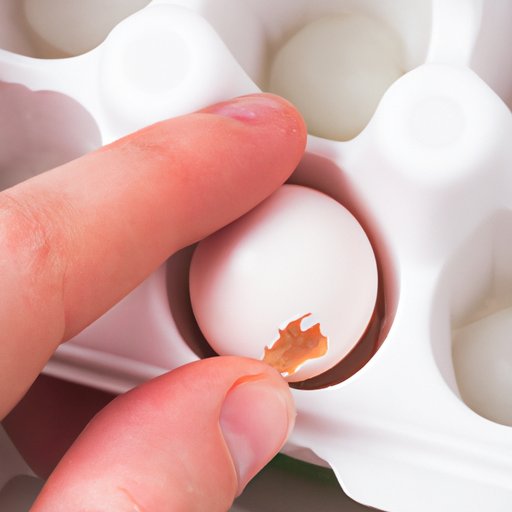
Introduction
It can be frustrating to open your fridge, crack an egg, and find out it has gone bad. Not only is it a waste of food, but consuming expired or rotten eggs can also lead to illness. That’s why it’s important to know how to check the freshness of your eggs before using them. In this article, we’ll explore several easy tests that you can do at home to determine the freshness of your eggs. Whether you’re an aspiring chef or a home cook, these simple tricks will help you avoid using bad eggs and keep you healthy.
The Float Test: An Easy Way to Tell If Your Eggs are Fresh or Old
The float test is a straightforward method you can use to determine the freshness of your eggs. Here’s how to do it:
- Fill a bowl with cold water.
- Gently place your egg in the water.
- Observe what happens:
- If the egg sinks and lays flat on the bottom, it’s fresh.
- If the egg sinks but stands on its point, it’s still good.
- If the egg floats, it’s old and should not be consumed.
The reason why the float test works is that as eggs get older, the air cell inside them grows larger. This makes the egg more buoyant and causes it to float. Fresh eggs, on the other hand, have smaller air cells and will remain submerged in water.
It’s important to note that the float test doesn’t tell you if an egg is bad, only if it’s old. If your egg passes this test, you can still use it as long as it doesn’t have a foul smell.
Your Nose Knows: How to Smell if Your Eggs are Bad
One of the best ways to tell if an egg has gone bad is to use your nose. Here’s what to smell for:
- A sulfuric, rotten smell.
If you smell this, the egg is not safe to eat and should be thrown out immediately.
It’s important to note that you should never smell an egg directly, as it can release harmful bacteria into the air. Instead, crack the egg into a dish and take a whiff. If it smells bad, throw it away and wash your hands and any surfaces the egg came into contact with.
The Candle Test: How to Check if Your Eggs Are Rotten Without Cracking Them
The candle test is a method of holding an egg up to a bright light source to see inside it. Here’s what to do:
- Go to a dark room or use a flashlight to illuminate the egg.
- Hold the egg up to the light, making sure to cover the light source with your fingers so that the light doesn’t blind you.
- Observe what happens:
- If the egg is fresh, you should see a clear, translucent yolk and white.
- If there’s a small air pocket and you see some shadowy lines, the egg is still good but should be used soon.
- If you see discoloration, spots, or the egg is opaque, it’s rotten and should not be consumed.
The reason why this test is called the “candle test” is that it was traditionally done with a candle. The light was held up to the egg to see its contents, and the candle protected the eyes from the bright light.
The Crack Test: The Simple Trick That Will Tell You if Your Eggs Are Still Good
The crack test is a simple yet effective way of determining if your eggs are fresh. Here’s what to do:
- Crack the egg into a bowl.
- Observe the consistency of the egg:
- If the white is firm and rounded and the yolk is high and round, it’s fresh.
- If the white is still firm, but the yolk is flat and the white is more liquid, it’s still good but should be used soon.
- If the white is runny and the yolk is flat, it’s gone bad.
The reason why this test works is that as eggs age, the whites become more runny, and the yolks flatten out. Fresh eggs, on the other hand, have firmer whites and yolks that hold their shape better.
Dates and Labels: How to Effectively Use Expiration Dates to Determine If Your Eggs Have Gone Bad
Expiration dates can be an excellent way to tell if your eggs are still good, but they can also be confusing. Here’s what you need to know:
- The sell-by date tells stores how long they can display the eggs for sale.
- The best-by date is a recommendation for how long you should use the eggs for best quality.
- The use-by date is when the eggs should be consumed by to avoid potential health risks.
It’s important to note that even if your eggs have passed their expiration date, they may still be good to use. According to the USDA, eggs can be safely consumed up to 5 weeks after their sell-by date. However, you should still check for signs of spoilage, like smell or appearance, before using them.
Conclusion
There are several easy and effective ways to check if your eggs have gone bad or if they’re still fresh. By using simple tests like the float test, smell test, candle test, and crack test, you can avoid consuming spoiled eggs and stay healthy. Remember to always check the expiration dates, and if in doubt, throw it out. By following these tips, you can reduce food waste and enjoy your eggs with confidence.





